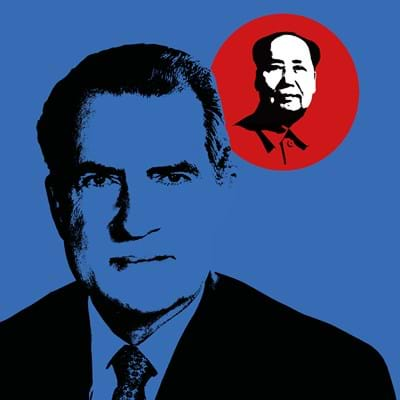|
Nixon in China is at the Festival Theatre Edinburgh for two performances (Thursday 27th and Saturday 29th February) and this opera in three acts by John Adams, with a libretto by Alice Goodman which premiered in 1987 inspired by Nixon’s much-publicised visit to China in 1972 breaks many of the stereotypes that many people might still have in their mind as to what opera is. Here we have no tragic heroine sacrificing herself on the altar of love, no double identity twists, and no star-crossed lovers. Instead we have a story based on what to many might not even be the subject for an opera –politics. Also breaking another operatic rule is the use of amplified sound in this production. In fact, with so much of the main vocal delivery performed direct into microphones for the world’s press, sound amplification is almost expected for this opera. Here tonight though this is done with technical sound’s skill and subtlety.
In this first for Scottish Opera, John Fulljames – Director of Opera at The Royal Danish Theatre – directs Adams’ iconic work, with designs by Dick Bird (The Mikado 2016). This work though is not only about the very public events of “Nixon in China”, but an insight into some of the private events hidden from the gaze of the world’s press. The approach used here to view our events in retrospect through archival storage of this historic meeting is an interesting one that, coupled with very inventive use of stage set design and image projections, allows for enormous flexibility in the storytelling. This is an opera, and of course the music and vocals are important, but out of all the operas that I have reviewed to date, this is the one where the actual text of the book is also an integral part of everything and used with enormous care and vision. Frequently here we are playing with the word games of politics and the veiled criticisms and often threats between the two opposing ideologies make an interesting verbal sparring game. The very careful use of images often adds extra weight to the commentary here too. Nixon in China is a powerful work, and director John Fulljames has done a fine job with this take on it. Conductor Joana Carneiro does a great job in interpreting a very modern, and often very minimalist, score that just seems not to have aged at all over the years. Words are however words, no matter how good they are, and they need that extra little bit of magic from a talented cast to truly bring them alive and make the magic happen, and here from the very first few moments it was obvious that our Richard Nixon (Eric Greene) had both the vocal ability and the dramatic ability to do this job. Adding hugely to the realism of this story, and often stealing many scenes, our Pat Nixon (Julia Sporsén) seemed perfectly cast for this role, and watching her performance whenever interacting with Eric Greene was simply a pleasure. There are also some beautifully portrayed little moments from Julia Sporsén when she finally meets her Chinese counterpart, Chiang Ch’ing (Madame Mao Tse-tung) performed by Hye-Youn Lee. These two women obviously do not like one another, and that is not surprising as there is a very dark and sinister presence to Hye-Youn Lee’s character here. This meeting took place when Mao Tse-tung (Mark Le Brocq) was in very poor health and this is another fine performance from Mark who confuses Nixon and Henry Kissinger (David Stout) by often talking in riddles and parables leaving Chinese Premiere Chou En-lai (Nicholas Lester) to translate as best he can his leader’s intentions. Politics are inseparable from this work, and the ideologies of both opposing sides are well represented here, and for this review I will leave the actual conflicting politics alone as they are so well documented in so many other sources. The one thing that is perhaps difficult for anyone too young to have lived through this historic event to imagine is just what an impact this meeting had on the world at the time and how totally unexpected it was. This “Red China” is not the China that we all now know, this is not the China that later declared Chairman Mao’s revolutionary implementation of his goal a mistake that resulted in the death of millions of people and hardships for uncounted more. One interesting theme that I am left with though is that fear that all governments seem to innately have of its citizens having free access to information without trying to influence it somewhere along the way. West, or East, just what are governments so frightened of if their citizens are not controlled in some direct or indirect way? Review by Tom King (c) 2020 Comments are closed.
|
AuthorWrite something about yourself. No need to be fancy, just an overview. Archives
December 2021
Categories |


 RSS Feed
RSS Feed